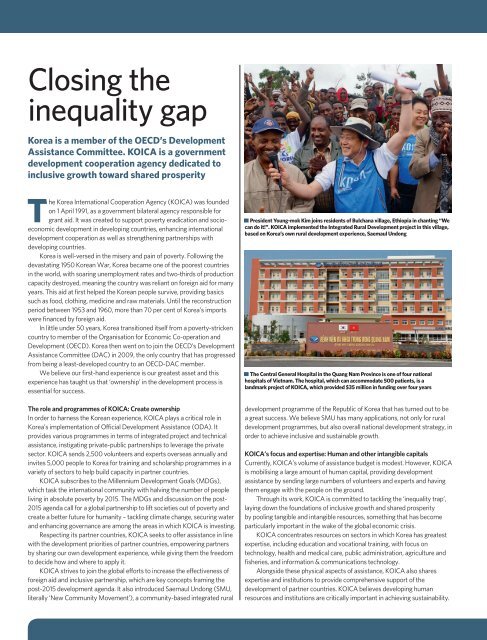FAMBB
FAMBB
FAMBB
You also want an ePaper? Increase the reach of your titles
YUMPU automatically turns print PDFs into web optimized ePapers that Google loves.
Closing theinequality gapKorea is a member of the OECD’s DevelopmentAssistance Committee. KOICA is a governmentdevelopment cooperation agency dedicated toinclusive growth toward shared prosperityThe Korea International Cooperation Agency (KOICA) was foundedon 1 April 1991, as a government bilateral agency responsible forgrant aid. It was created to support poverty eradication and socioeconomicdevelopment in developing countries, enhancing internationaldevelopment cooperation as well as strengthening partnerships withdeveloping countries.Korea is well-versed in the misery and pain of poverty. Following thedevastating 1950 Korean War, Korea became one of the poorest countriesin the world, with soaring unemployment rates and two-thirds of productioncapacity destroyed, meaning the country was reliant on foreign aid for manyyears. This aid at first helped the Korean people survive, providing basicssuch as food, clothing, medicine and raw materials. Until the reconstructionperiod between 1953 and 1960, more than 70 per cent of Korea’s importswere financed by foreign aid.In little under 50 years, Korea transitioned itself from a poverty-strickencountry to member of the Organisation for Economic Co-operation andDevelopment (OECD). Korea then went on to join the OECD’s DevelopmentAssistance Committee (DAC) in 2009, the only country that has progressedfrom being a least-developed country to an OECD-DAC member.We believe our first-hand experience is our greatest asset and thisexperience has taught us that ‘ownership’ in the development process isessential for success.The role and programmes of KOICA: Create ownershipIn order to harness the Korean experience, KOICA plays a critical role inKorea’s implementation of Official Development Assistance (ODA). Itprovides various programmes in terms of integrated project and technicalassistance, instigating private-public partnerships to leverage the privatesector. KOICA sends 2,500 volunteers and experts overseas annually andinvites 5,000 people to Korea for training and scholarship programmes in avariety of sectors to help build capacity in partner countries.KOICA subscribes to the Millennium Development Goals (MDGs),which task the international community with halving the number of peopleliving in absolute poverty by 2015. The MDGs and discussion on the post-2015 agenda call for a global partnership to lift societies out of poverty andcreate a better future for humanity – tackling climate change, securing waterand enhancing governance are among the areas in which KOICA is investing.Respecting its partner countries, KOICA seeks to offer assistance in linewith the development priorities of partner countries, empowering partnersby sharing our own development experience, while giving them the freedomto decide how and where to apply it.KOICA strives to join the global efforts to increase the effectiveness offoreign aid and inclusive partnership, which are key concepts framing thepost-2015 development agenda. It also introduced Saemaul Undong (SMU,literally ‘New Community Movement’), a community-based integrated rural●President Young-mok Kim joins residents of Bulchana village, Ethiopia in chanting “Wecan do it!”. KOICA implemented the Integrated Rural Development project in this village,based on Korea’s own rural development experience, Saemaul Undong●The Central General Hospital in the Quang Nam Province is one of four nationalhospitals of Vietnam. The hospital, which can accommodate 500 patients, is alandmark project of KOICA, which provided $35 million in funding over four yearsdevelopment programme of the Republic of Korea that has turned out to bea great success. We believe SMU has many applications, not only for ruraldevelopment programmes, but also overall national development strategy, inorder to achieve inclusive and sustainable growth.KOICA’s focus and expertise: Human and other intangible capitalsCurrently, KOICA’s volume of assistance budget is modest. However, KOICAis mobilising a large amount of human capital, providing developmentassistance by sending large numbers of volunteers and experts and havingthem engage with the people on the ground.Through its work, KOICA is committed to tackling the ‘inequality trap’,laying down the foundations of inclusive growth and shared prosperityby pooling tangible and intangible resources, something that has becomeparticularly important in the wake of the global economic crisis.KOICA concentrates resources on sectors in which Korea has greatestexpertise, including education and vocational training, with focus ontechnology, health and medical care, public administration, agriculture andfisheries, and information & communications technology.Alongside these physical aspects of assistance, KOICA also sharesexpertise and institutions to provide comprehensive support of thedevelopment of partner countries. KOICA believes developing humanresources and institutions are critically important in achieving sustainability.


